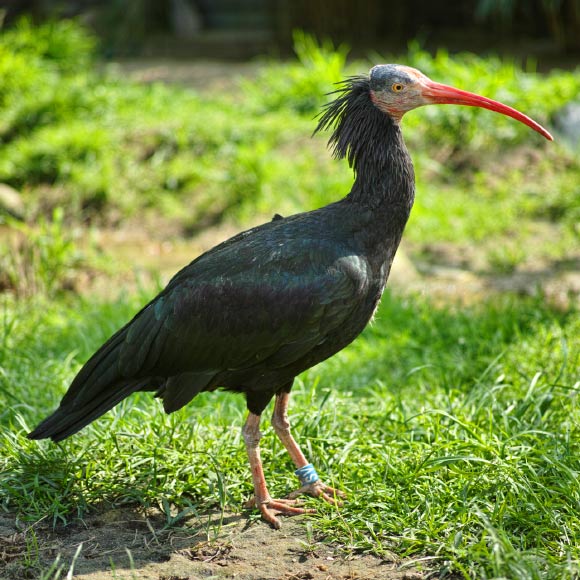According to a team of ornithologists led by University of Vienna scientist Didone Frigerio, laying eggs and raising chicks can have a negative effect on the health of birds.

A Northern Bald Ibis (Geronticus eremita) in Vienna Zoo, Austria. Image credit: Robert F. Tobler / CC BY-SA 3.0.
Dr. Frigerio and her colleagues investigated the social interactions and health of a colony of Northern Bald Ibis (Geronticus eremita) – a socially monogamous and year-round colonial bird — at the Konrad Lorenz Research Station in Austria.
The scientists found that birds that were in pairs excreted a higher number of fecal samples containing parasite eggs than single birds, indicating that they are less healthy. And females generally excreted more of these nematode eggs than males.
Egg laying is known to be energetically costly and a limiting factor for parental fitness. Therefore, the higher parasite load in females compared to males could be a result of a decreased immune system in response to the physical demands of egg laying.
The researchers also found that the higher number of ibis eggs a female laid, the higher number of parasite eggs were found in their fecal samples.
Interestingly, this pattern reversed when looking at the number of fledglings — chicks hatching and leaving the nest, with birds excreting fewer parasites having a higher number of fledglings.
The results, published online in the Journal of Ornithology, suggest that the high investment in egg production impacts the caregiving towards the chicks by the parasitized female, leading to a reduced number of fledglings.
“The high parasite load in the paired Northern Bald Ibis individuals in our study highlights the high energetic demands on both sexes during reproduction and chick rearing, which may in turn affect their immune system,” said study senior author Dr Claudia Wascher of Anglia Ruskin University.
“The results suggest that social behavior, parasite burden and physiology are linked in a complex manner. And this may be a factor not only in birds but in social vertebrates in general.”
“The Northern Bald Ibis is critically endangered and so a better understanding of how the costs of reproduction affect reproductive output could help to support conservation programs and its re-introduction into the wild.”
_____
Didone Frigerio et al. Excretion patterns of coccidian oocysts and nematode eggs during the reproductive season in Northern Bald Ibis (Geronticus eremita). Journal of Ornithology, published online February 4, 2016; doi: 10.1007/s10336-015-1317-z







